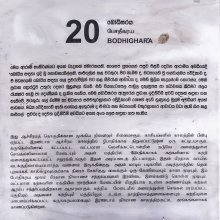Mulika, Mūlika: 16 definitions
Introduction:
Mulika means something in Hinduism, Sanskrit, Buddhism, Pali, biology. If you want to know the exact meaning, history, etymology or English translation of this term then check out the descriptions on this page. Add your comment or reference to a book if you want to contribute to this summary article.
Images (photo gallery)
In Hinduism
Purana and Itihasa (epic history)
Source: Cologne Digital Sanskrit Dictionaries: The Purana Index1a) Mūlika (मूलिक).—A Pārāsara branch.*
- * Vāyu-purāṇa 70. 87.
1b) Medicinal plants; many of them named.*
- * Matsya-purāṇa 218. 23-35.

The Purana (पुराण, purāṇas) refers to Sanskrit literature preserving ancient India’s vast cultural history, including historical legends, religious ceremonies, various arts and sciences. The eighteen mahapuranas total over 400,000 shlokas (metrical couplets) and date to at least several centuries BCE.
Biology (plants and animals)
Source: Wisdom Library: Local Names of Plants and DrugsMulika [मूलिका] in the Sanskrit language is the name of a plant identified with Raphanus sativus from the Brassicaceae (Mustard) family. For the possible medicinal usage of mulika, you can check this page for potential sources and references, although be aware that any some or none of the side-effects may not be mentioned here, wether they be harmful or beneficial to health.
Source: Google Books: CRC World Dictionary (Regional names)Mulika in India is the name of a plant defined with Raphanus sativus in various botanical sources. This page contains potential references in Ayurveda, modern medicine, and other folk traditions or local practices It has the synonym Raphanus niger Miller (among others).
Example references for further research on medicinal uses or toxicity (see latin names for full list):
· Journal of Japanese Botany (1917)
· Botanical Magazine (1935)
· Acta Phytotaxonomica Sinica (1986)
· Gardeners Dictionary, ed. 8 (1768)
· Proceedings of the Indian Science Congress Association (1990)
· Glucosinolates.
If you are looking for specific details regarding Mulika, for example diet and recipes, chemical composition, health benefits, extract dosage, pregnancy safety, side effects, have a look at these references.

This sections includes definitions from the five kingdoms of living things: Animals, Plants, Fungi, Protists and Monera. It will include both the official binomial nomenclature (scientific names usually in Latin) as well as regional spellings and variants.
Languages of India and abroad
Pali-English dictionary
Source: BuddhaSasana: Concise Pali-English Dictionarymūlika : (adj.) fundamental; elementary.
Source: Sutta: The Pali Text Society's Pali-English DictionaryMūlika, (adj. n.) (fr. mūla) 1. (m.) root-vendor Miln. 331.—2. (adj.—°) belonging to the feet (pāda°), a footman, lackey J. I, 122, 438; II, 300 sq. (N. of the king of Janasandha, Gāmaṇi-caṇḍa); III, 417; V, 128; VI, 30.—3. in rukkha° one who lives at the foot of a tree: see under rukkha, where also °mūlikatta. (Page 540)

Pali is the language of the Tipiṭaka, which is the sacred canon of Theravāda Buddhism and contains much of the Buddha’s speech. Closeley related to Sanskrit, both languages are used interchangeably between religions.
Sanskrit dictionary
Source: DDSA: The practical Sanskrit-English dictionaryMūlika (मूलिक).—a.
1) Radical, original.
2) Primary, principal.
3) Living on roots.
-kaḥ A devotee, an ascetic.
-kā 1 A root.
2) A collection of roots.
Source: Cologne Digital Sanskrit Dictionaries: Edgerton Buddhist Hybrid Sanskrit DictionaryMūlika (मूलिक).—adj., (1) (Sanskrit Lex. id.) living on roots (as an ascetic practice): śatabhiṣāyāṃ jāto °ko bhavati Divyāvadāna 647.1; mūliko brāhmaṇaḥ, sa mūlānām arthe 'nyatamaṃ parvatam abhirūḍhaḥ Avadāna-śataka ii.125.6; aneka-mūlika, epithet of ascetic practices, (ātāpanaparitāpanaiḥ…) aneka-mūlikair Lalitavistara 248.17, consisting of living on many roots; (2) ifc. [bahuvrīhi], having…as cause, = Sanskrit -mūlaka, and perhaps corruption for this: kiṃmūlikā (n. pl. m.) utpadyanti Mahāvastu iii.337.11, having what source do they arise?, but the normal Sanskrit -mūlaka is used in parallels below, 13, 16 ff., and kiṃ- mūlaka 339.10, probably read °laka.
--- OR ---
Mūlikā (मूलिका).—(compare Sanskrit mūla, capital), stock, supply, in kāṣṭha-°kā, stock, supply of wood: Divyāvadāna 500.9—10, 15.
Source: Cologne Digital Sanskrit Dictionaries: Shabda-Sagara Sanskrit-English DictionaryMūlika (मूलिक).—mfn.
(-kaḥ-kī-kaṃ) Radical, (literal or figurative,) primary, principal. m.
(-kaḥ) A devotee, living on roots. E. mūla a root, ṭhak aff.
Source: Cologne Digital Sanskrit Dictionaries: Benfey Sanskrit-English DictionaryMūlika (मूलिक).—i. e. mūla + ika, I. adj. Radical, primary. Ii. m. A devotee. Iii. f. kā, A multitude of roots (?), [Pañcatantra] 157, 24.
Source: Cologne Digital Sanskrit Dictionaries: Cappeller Sanskrit-English DictionaryMūlika (मूलिक).—[adjective] radical, original.
Source: Cologne Digital Sanskrit Dictionaries: Monier-Williams Sanskrit-English Dictionary1) Mūlikā (मूलिका):—[from mūlaka > mūl] a f. a root used in magic, [Pañcatantra; Siṃhāsana-dvātriṃśikā or vikramāditya-caritra, jaina recension]
2) Mūlika (मूलिक):—[from mūl] mfn. original, [Tattvasamāsa]
3) [v.s. ...] primary, principal, [Horace H. Wilson]
4) [v.s. ...] living on root, [cf. Lexicographers, esp. such as amarasiṃha, halāyudha, hemacandra, etc.]
5) [v.s. ...] m. an ascetic, [cf. Lexicographers, esp. such as amarasiṃha, halāyudha, hemacandra, etc.]
6) [v.s. ...] a seller of roots, [Nārada-smṛti, nāradīya-dharma-śāstra] ([according to] to others = mūlam vipralambhas tat-kārī)
7) Mūlikā (मूलिका):—[from mūlika > mūl] b f. a multitude or collection of roots, [Monier-Williams’ Sanskrit-English Dictionary]
Source: Cologne Digital Sanskrit Dictionaries: Yates Sanskrit-English DictionaryMūlika (मूलिक):—[(kaḥ-kī-kaṃ) a.] Radical. m. A devotee living on roots.
Source: DDSA: Paia-sadda-mahannavo; a comprehensive Prakrit Hindi dictionary (S)Mūlikā (मूलिका) in the Sanskrit language is related to the Prakrit word: Mūligā.
[Sanskrit to German]
Sanskrit, also spelled संस्कृतम् (saṃskṛtam), is an ancient language of India commonly seen as the grandmother of the Indo-European language family (even English!). Closely allied with Prakrit and Pali, Sanskrit is more exhaustive in both grammar and terms and has the most extensive collection of literature in the world, greatly surpassing its sister-languages Greek and Latin.
Kannada-English dictionary
Source: Alar: Kannada-English corpusMūlika (ಮೂಲಿಕ):—
1) [adjective] first in time or order of development; primitive; original; earliest; primary.
2) [adjective] important; prominent; principal.
3) [adjective] eating the roots, yams, etc. for food.
--- OR ---
Mūlika (ಮೂಲಿಕ):—[noun] a man who lives on roots, yams, of plants (as a religious vow).
Kannada is a Dravidian language (as opposed to the Indo-European language family) mainly spoken in the southwestern region of India.
See also (Relevant definitions)
Starts with: Mulikarana, Mulikarman, Mulikartha, Mulikasiddhi.
Ends with (+11): Ambumulika, Ashtapadamulika, Balamulika, Bhringamulika, Bhringhamulika, Bhurimulika, Candramulika, Chandramulika, Chanramulika, Chitramulika, Dantamulika, Dashamulika, Dhumramulika, Dirghamulika, Gandhamulika, Gucchamulika, Khamulika, Mahapadamulika, Masamulika, Mattavanmaunamulika.
Full-text (+12): Maulikya, Dantamulika, Mulikartha, Nyagrodhamula, Vrikshamulika, Dirghamulaka, Pancamulika, Dashamulika, Vindhyamulika, Mattavanmaunamulika, Siddhamulikanighantu, Talamulika, Balamulika, Muliga, Gucchamulika, Khamulika, Bhringamulika, Gandhamulaka, Khamuli, Dirghamulika.
Relevant text
Search found 3 books and stories containing Mulika, Mūlika, Mūlikā; (plurals include: Mulikas, Mūlikas, Mūlikās). You can also click to the full overview containing English textual excerpts. Below are direct links for the most relevant articles:
The Garuda Purana (by Manmatha Nath Dutt)
Chapter LV - Description of the Geographical situations of the different countries of the earth < [Agastya Samhita]
Historical Elements in the Matsya Purana (by Chaitali Kadia)
The River Gaṅgā or Ganges < [Chapter 4 - Geographical history in the Matsya-Purāṇa]
The Skanda Purana (by G. V. Tagare)
Chapter 38 - Acquisition of the Charter by Brāhmaṇas < [Section 2 - Dharmāraṇya-khaṇḍa]




